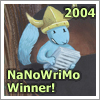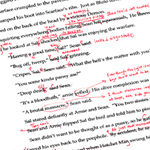Folks often ask how many drafts are necessary, or how do you edit a novel, and so on. Like most things, I don’t believe there is One True Way, but I thought I’d share my own method. This is as much to point other people at later as it is to document my own process to help me remember when I get to this point on the next novel.
 I already wrote about how I draft a novel, which is mostly an exercise in flying by the seat of my pants with only my destination and a few waypoints in mind. What I end up with from that is a mess. It’s not so much that the plot wanders all over – at least not so far – but that it’s filled with bad grammar, sloppy spelling, and a bucket-full of notes that look like this: [so, is the mom dead or not? need to fix this back in act 1] Character motivations are sloppy, major revelations are either broadcast too early or come out of nowhere, and the climax depends on something critical that I forgot to include in chapter three.
I already wrote about how I draft a novel, which is mostly an exercise in flying by the seat of my pants with only my destination and a few waypoints in mind. What I end up with from that is a mess. It’s not so much that the plot wanders all over – at least not so far – but that it’s filled with bad grammar, sloppy spelling, and a bucket-full of notes that look like this: [so, is the mom dead or not? need to fix this back in act 1] Character motivations are sloppy, major revelations are either broadcast too early or come out of nowhere, and the climax depends on something critical that I forgot to include in chapter three.
Clearly, it’s not ready for publication. It’s not ready for any kind of professional submission. It’s not even ready for me to show it to a friend. I call it my first draft, but even that is being a little too kind. Instead, I refer to it internally by a version number: version 0.9.
 The absolutely first thing I do is nothing. I wait, typically at least two to three months, preferably while working on a different project, perhaps writing another draft of something else. It’s very important to get some distance from that first draft, because if I dive back in right away, I can’t really see it for what’s on the page. I still see it for what was in my head.
The absolutely first thing I do is nothing. I wait, typically at least two to three months, preferably while working on a different project, perhaps writing another draft of something else. It’s very important to get some distance from that first draft, because if I dive back in right away, I can’t really see it for what’s on the page. I still see it for what was in my head.
So, after waiting a while, the first real action I take is to make an edit pass all on my own. This edit pass starts with me printing out a copy. I take it to the local copy shop and get them to print it out on 8.5 x 11 sheets, single-spaced, but printed on only one side. I go with a spiral binding because that works out better for me physically. They put a clear front cover on it, and the first page has the working title, and the version history so far (since the initial vomit-draft may have been built up in stages of 0.10, 0.11, and so forth). I also make sure each page has the title, the version number, and the page number.
 I then go through with a bright red pen. I’ve been using a Signo Uniball gel pen lately. Part of me still prefers the feel of the older Uniball Micro, but there’s a key difference that actually impacts the editing process. The Signo lets me open and close the pen simply by clicking on the end with my thumb, while the older Micro requires me to remove and replace the pen’s cap. I found that this simple change in the motion required both sped up my edits as well as got me to flag more items and make more notes.
I then go through with a bright red pen. I’ve been using a Signo Uniball gel pen lately. Part of me still prefers the feel of the older Uniball Micro, but there’s a key difference that actually impacts the editing process. The Signo lets me open and close the pen simply by clicking on the end with my thumb, while the older Micro requires me to remove and replace the pen’s cap. I found that this simple change in the motion required both sped up my edits as well as got me to flag more items and make more notes.
So, what am I flagging and noting? Well, what I’m not doing is trying to fine tune the language and catch all the typos. Certainly, if I see something, I’ll flag it, but that’s not the focus of this editing pass. Mostly, I’m looking for story and character problems. Did a cool character show up too late in the book? Is the protagonist’s major shift too predictable? Is that subplot boring? Does the climax really work as is? Remember that I’m doing this all on paper, so I’m not actually fixing anything. I’m just spotting problems. Some of the notes will fit in the margin, but longer notes go on the blank facing page – remember, I only printed on one-side of the pages. I’ll even go back and scribble notes like “This would be a good place to introduce the jailer. Insert a scene here.” Keeping it on paper forces me to look at the novel as a whole and doesn’t let me start making fixes before I’ve seen the entirety of the problems.
 Then, once I’ve thoroughly bloodied the printout, I open up the document and start fixing things. Awkward sections get rewritten. New scenes are added. In my experience so far, the book grows about 5-10% during this stage. And while I’m not trying to make it perfect, I’ll at least make a pass through it with Word’s spelling and grammar checker. Most of the errors it flags are to be ignored (unusual names, unusual but not incorrect grammar, etc), but I try to fix any true errors it gives me.
Then, once I’ve thoroughly bloodied the printout, I open up the document and start fixing things. Awkward sections get rewritten. New scenes are added. In my experience so far, the book grows about 5-10% during this stage. And while I’m not trying to make it perfect, I’ll at least make a pass through it with Word’s spelling and grammar checker. Most of the errors it flags are to be ignored (unusual names, unusual but not incorrect grammar, etc), but I try to fix any true errors it gives me.
By this point, the story works and the characters are at least reasonable. I won’t say that this is the best I can make it, but it’s at least good enough to show it to someone. I call this version 1.0.
Then I go print out more copies of this one, just like the first one I printed. The history and version numbers are updated, but otherwise, it’s the exact same format. I pass these off to my beta readers.
I should say a thing or two about beta readers, but it would take up too much space. Suffice it to say, they know the genre, they know the difference between good stories and bad ones, and they’re not afraid to tell me something I won’t like. How you get those is probably another blog entry.
So anyway, I give the book to some beta readers. They get the physical copies of the book along with a brand new red pen. I make it clear to them that I want their reactions to the story, but they should feel free to mark up specific sections that need rework, identify typos, or simply jot down their immediate reactions in the margins. I give them a month.
After the month, I sit down and try to debrief them. I let them go through their copy page by page, and let their notes remind them of any thoughts they had. Meanwhile, I’m taking notes in a separate notebook. Afterwards, I’ll ask them for any other feedback, and when they are done I may ask them specific questions. Did the big reveal in chapter 12 surprise you, or had you figured it out already? I was trying to imply that Jake is Bill’s brother… did that get through? Did you believe in Sam’s redemption? At no time in all of this do I try to defend the work, tell them that they should have “gotten it”, or discredit their reactions. I just sit there and take notes.
 Then I wait. Yes, again. It doesn’t have to be three months, but I like to wait at least a few weeks. Why? I have to let their feedback sink in. When I first get that feedback, it’s my instinct to defend my book. After all, it makes perfect sense in my head. The characters are quite believable. Justice is sweet, not contrived. So I sit on their feedback for a while, and think it over. After a month or so, I begin to see that there’s some truth to what they said.
Then I wait. Yes, again. It doesn’t have to be three months, but I like to wait at least a few weeks. Why? I have to let their feedback sink in. When I first get that feedback, it’s my instinct to defend my book. After all, it makes perfect sense in my head. The characters are quite believable. Justice is sweet, not contrived. So I sit on their feedback for a while, and think it over. After a month or so, I begin to see that there’s some truth to what they said.
So then I open up the document again, update the version number to 1.10, and start editing. I array all of the marked-up beta copies around me, and I go page by page, reworking problems that they identified. Some problems are too big for this style of editing, but as I go through, I’m reading my work as well, trying to see the bigger issues they found. Still, I keep plugging through to the end, fixing up the page-by-page stuff that I can.
And those big issues? There’s a reason for putting them off just a bit. You see, when I go through that page-by-page pass, I’m reading the novel again, and all the while I’m thinking about those big issues that the beta readers identified. For a lot of them, I’m kicking myself for not having seeing such a huge problem on my own. For others, I’m realizing that this was probably more about that particular beta reader than about my book. The rest are somewhere in between, but by the time I’ve read the book again while thinking about those bigger problems, I have an idea not only of whether they’re real but also of how to fix them.
So then I start hopping around doing heavier lifting. I add scenes. I rewrite dialog. I reorder events. This can be big and bloody, carving out organs and slamming new ones in their place. Depending on just how bloody this is, I may have to make a second read/edit pass to make sure I caught all the consistency issues. If I’m changing Bob’s gender, yeah, that’s going to take an extra pass, just looking for all the him/her stuff.
Then I think about how much I changed. Was it only a little? If so, then I’m pretty much done. But if the changes were big, then it’s back to the beta readers to get their feedback on the new version, 1.10. And that might result in even bigger changes, which have to go back to the beta readers as 1.20, and so on. Eventually though, I’ll either give up, or the changes will be small enough that I don’t feel the need to go back to the beta readers again. Thus, the answer to the question, “how many drafts does it take?” is “as many as it needs!”
And that is what I call my “final draft”, typically version 1.1 or 1.2. God help me if it ever gets to 4.5.
But what about word crafting and copyediting? After all, I kept saying above that I wasn’t worried about that stuff. Well, I push that off to a second kind of editing job that I call polishing, not editing. Polishing takes me from “final draft” to “final text”, and from there it’s yet another set of tasks of formatting, cover design, etc. that I call publishing. So, as I finish up polishing and publishing this next book, look for those to show up as entries of their own.

 I love NaNoWriMo! After piddling around for twenty years with outlines, back-stories, and world-building – and barely three chapters of actual novel – NaNoWriMo got my butt into the chair for some serious work. In 2004, I put in 51,000 words on a novel that was something like Pinocchio’s tale but with androids. I never did actually finish off the plot for that story, but by the time I finally gave up, I had more than 65,000 words of a novel. The story has its problems, and it was on target to be a bloated 150,000 words, but damn it, it was more than I had written in any single tale I had ever attempted. It felt good, and it made me the dedicated pantser that I am today.
I love NaNoWriMo! After piddling around for twenty years with outlines, back-stories, and world-building – and barely three chapters of actual novel – NaNoWriMo got my butt into the chair for some serious work. In 2004, I put in 51,000 words on a novel that was something like Pinocchio’s tale but with androids. I never did actually finish off the plot for that story, but by the time I finally gave up, I had more than 65,000 words of a novel. The story has its problems, and it was on target to be a bloated 150,000 words, but damn it, it was more than I had written in any single tale I had ever attempted. It felt good, and it made me the dedicated pantser that I am today. I love the camaraderie, the constant updating of my word-count spreadsheet, and even the crazy rush as the week of Thanksgiving rolls around. It takes one of the loneliest tasks in the world and turns it into a party. The success and failures of those around you gives you both inspiration and cautionary tales. So, if you have ever thought about writing a novel, I encourage you dive on in and make NaNoWriMo 2013 your path to wordsmithing glory!
I love the camaraderie, the constant updating of my word-count spreadsheet, and even the crazy rush as the week of Thanksgiving rolls around. It takes one of the loneliest tasks in the world and turns it into a party. The success and failures of those around you gives you both inspiration and cautionary tales. So, if you have ever thought about writing a novel, I encourage you dive on in and make NaNoWriMo 2013 your path to wordsmithing glory! Even apart from word-count, did you actually get to the end of the story? Have Bilbo and the dwarves defeated Smaug, or are they just now leaving Rivendale? When I bailed on my 2004 effort (the unnamed Pinocchio tale), I was barely past the 40% mark of where that story was going. On December 1, 2005, Beneath the Sky had just dealt with the pirate attack. That pattern carried through on both Hell Bent and Ships of My Fathers. I was proceeding at the right plot-pace to get to 80-100,000 words, but I simply hadn’t gotten there yet. No one wants to read a book that ends in Act II.
Even apart from word-count, did you actually get to the end of the story? Have Bilbo and the dwarves defeated Smaug, or are they just now leaving Rivendale? When I bailed on my 2004 effort (the unnamed Pinocchio tale), I was barely past the 40% mark of where that story was going. On December 1, 2005, Beneath the Sky had just dealt with the pirate attack. That pattern carried through on both Hell Bent and Ships of My Fathers. I was proceeding at the right plot-pace to get to 80-100,000 words, but I simply hadn’t gotten there yet. No one wants to read a book that ends in Act II. So, I’m not doing NaNoWriMo this year, but not because of the reasons I hate it. Nor am I dead set on never doing NaNoWriMo again in the future. It’s just that I’ve gotten past the point where I need it to be November for me to pile on in and write a new novel. Since 2011 I’ve written two other novels, neither of which were in November. I plugged away with NaNoWriMo intensity – typically shooting for 2500 words per day, not a mere 1667. I think I’ve mastered the process of getting that first draft out of my brain and onto the page.
So, I’m not doing NaNoWriMo this year, but not because of the reasons I hate it. Nor am I dead set on never doing NaNoWriMo again in the future. It’s just that I’ve gotten past the point where I need it to be November for me to pile on in and write a new novel. Since 2011 I’ve written two other novels, neither of which were in November. I plugged away with NaNoWriMo intensity – typically shooting for 2500 words per day, not a mere 1667. I think I’ve mastered the process of getting that first draft out of my brain and onto the page.


 The absolutely first thing I do is nothing. I wait, typically at least two to three months, preferably while working on a different project, perhaps writing another draft of something else. It’s very important to get some distance from that first draft, because if I dive back in right away, I can’t really see it for what’s on the page. I still see it for what was in my head.
The absolutely first thing I do is nothing. I wait, typically at least two to three months, preferably while working on a different project, perhaps writing another draft of something else. It’s very important to get some distance from that first draft, because if I dive back in right away, I can’t really see it for what’s on the page. I still see it for what was in my head.
 Then, once I’ve thoroughly bloodied the printout, I open up the document and start fixing things. Awkward sections get rewritten. New scenes are added. In my experience so far, the book grows about 5-10% during this stage. And while I’m not trying to make it perfect, I’ll at least make a pass through it with Word’s spelling and grammar checker. Most of the errors it flags are to be ignored (unusual names, unusual but not incorrect grammar, etc), but I try to fix any true errors it gives me.
Then, once I’ve thoroughly bloodied the printout, I open up the document and start fixing things. Awkward sections get rewritten. New scenes are added. In my experience so far, the book grows about 5-10% during this stage. And while I’m not trying to make it perfect, I’ll at least make a pass through it with Word’s spelling and grammar checker. Most of the errors it flags are to be ignored (unusual names, unusual but not incorrect grammar, etc), but I try to fix any true errors it gives me. Then I wait. Yes, again. It doesn’t have to be three months, but I like to wait at least a few weeks. Why? I have to let their feedback sink in. When I first get that feedback, it’s my instinct to defend my book. After all, it makes perfect sense in my head. The characters are quite believable. Justice is sweet, not contrived. So I sit on their feedback for a while, and think it over. After a month or so, I begin to see that there’s some truth to what they said.
Then I wait. Yes, again. It doesn’t have to be three months, but I like to wait at least a few weeks. Why? I have to let their feedback sink in. When I first get that feedback, it’s my instinct to defend my book. After all, it makes perfect sense in my head. The characters are quite believable. Justice is sweet, not contrived. So I sit on their feedback for a while, and think it over. After a month or so, I begin to see that there’s some truth to what they said.